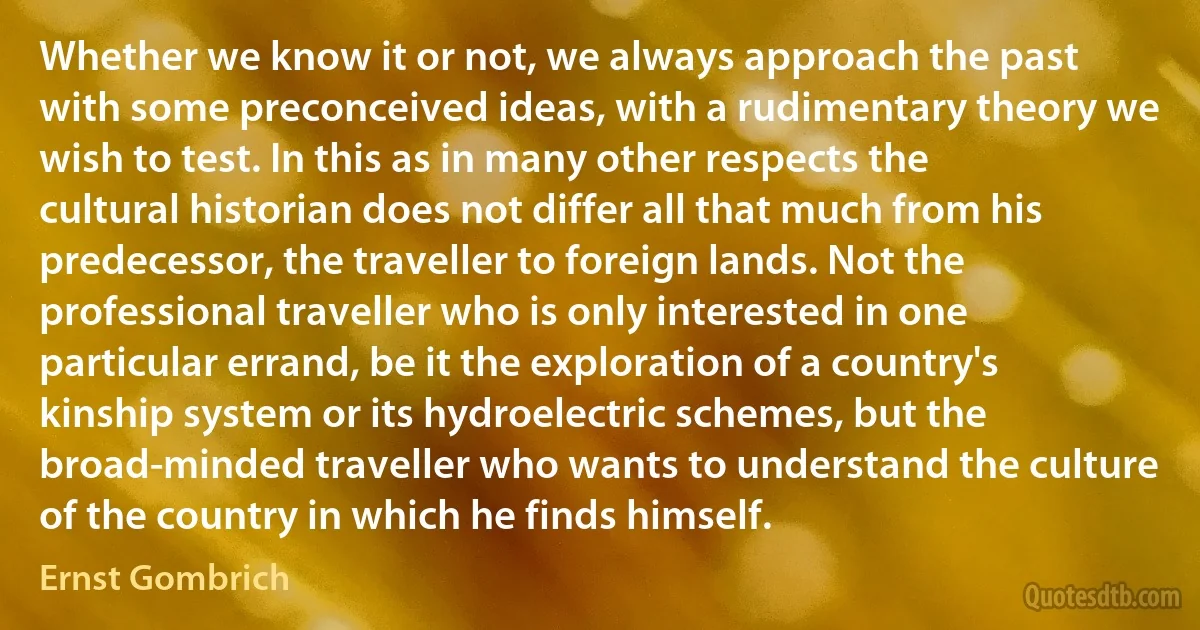
Whether we know it or not, we always approach the past with some preconceived ideas, with a rudimentary theory we wish to test. In this as in many other respects the cultural historian does not differ all that much from his predecessor, the traveller to foreign lands. Not the professional traveller who is only interested in one particular errand, be it the exploration of a country's kinship system or its hydroelectric schemes, but the broad-minded traveller who wants to understand the culture of the country in which he finds himself.
Ernst GombrichRelated topics
approach country exploration foreign historian past predecessor professional rudimentary wish travellerRelated quotes
In asking forgiveness of women for our mythologizing of their bodies, for being unreal about them, we can only appeal to their own sexuality, which is different but not basically different, perhaps, from our own. For women, too, there seems to be that tangle of supplication and possessiveness, that descent toward infantile undifferentiation, that omnipotent helplessness, that merger with the cosmic mother-warmth, that flushed pulse-quickened leap into overestimation, projection, general mix-up.

John Updike
Breathes there the man, with soul so dead, Who never to himself hath said, This is my own, my native land Whose heart hath neer within him burnd, As home his footsteps he hath turnd From wandering on a foreign strand If such there breathe, go mark him well For him no Minstrel raptures swell High though his titles, proud his name, Boundless his wealth as wish can claim Despite those titles, power, and pelf, The wretch, concentred all in self, Living, shall forfeit fair renown, And, doubly dying, shall go down To the vile dust, from whence he sprung, Unwept, unhonord, and unsung.

Walter Scott
On this question of principle, while actual suffering was yet afar off, they the Colonies raised their flag against a power to which, for purposes of foreign conquest and subjugation, Rome in the height of her glory is not to be compared,a power which has dotted over the surface of the whole globe with her possessions and military posts, whose morning drum-beat, following the sun, and keeping company with the hours, circles the earth with one continuous and unbroken strain of the martial airs of England.

Daniel Webster
O God, enlarge within us the sense of fellowship with all living things, even our brothers, the animals, to whom Thou gavest the earth as their home in common with us. We must remember with shame that in the past we have exercised the high dominion of man with ruthless cruelty so that the voice of the earth, which should have gone up to thee in song, has been a groan of pain. May we realize that they live, not for us alone, but for themselves and for Thee and that they love the sweetness of life.

Basil of Caesarea
God always was, and always is, and always will be. Or rather, God always Is. For Was and Will be are fragments of our time, and of changeable nature, but He is Eternal Being. And this is the Name that He gives to Himself when giving the Oracle to Moses in the Mount. For in Himself He sums up and contains all Being, having neither beginning in the past nor end in the future; like some great Sea of Being, limitless and unbounded, transcending all conception of time and nature, only adumbrated [intimated] by the mind, and that very dimly and scantily.

Gregory of Nazianzus
